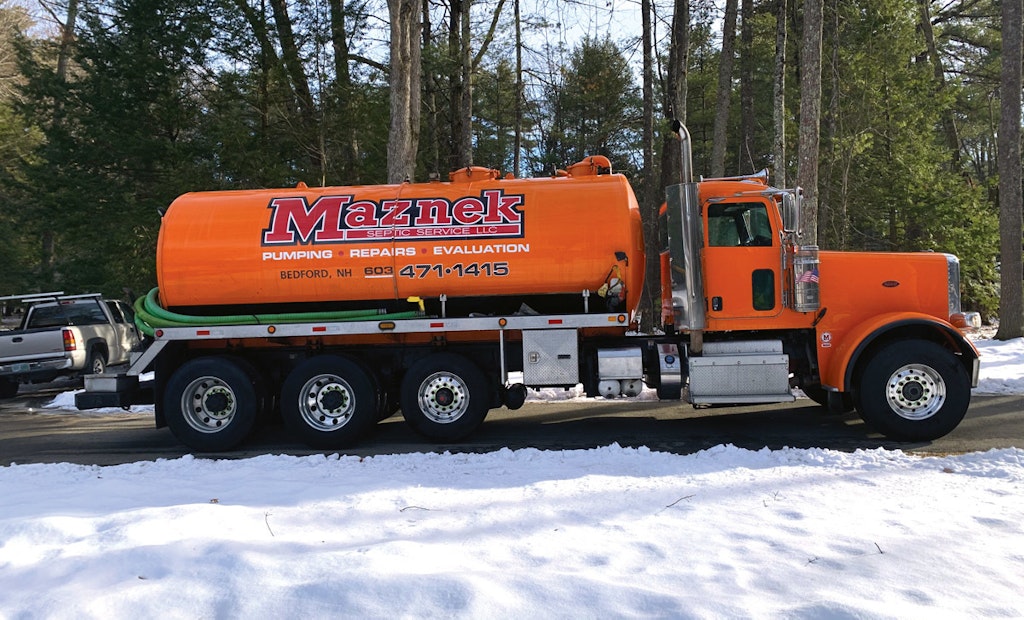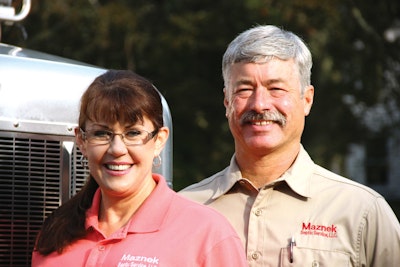
This is Maznek’s 2015 Peterbilt vacuum truck from Pik Rite with a 4,600-gallon steel tank and Masport pump.
Name and title or job description: Larry Maznek, owner/operator with my wife Patrice. I’m a septic designer, evaluator, pumper and installer.
Business name and location: Maznek Septic Service, Bedford, New Hampshire
Services we offer: Pumping of septic systems and grease traps, evaluations and repairs. We stopped doing installations and design. I just don’t have time.
Age: 61
Years in the industry: 10
Association involvement: I am the acting president of the New Hampshire Association of Septage Haulers. I’m also on the board of the Granite State Onsite Wastewater Association (formerly Granite State Designers and Installers Association). I’ve been a member of both associations for 10 years.
Benefits of belonging to the association: It enables me to stay current with regulations and trends. And you stay connected with people. When we meet in person, it is interactive and you’d get ideas. People tell you things they are doing differently.
Biggest issue facing your association right now: Lack of membership and participation. Most of the business owners are older. But it’s starting to turn around with some younger people coming in, which is a good thing. The younger folks just get so busy with getting their businesses going and keeping their families going; they don’t have time to get involved with the organizations.
Our crew includes: Patrice is the office administrator. Joyce Beddard is our bookkeeper and helps Patrice when we’re busy. Greg Scott is our service technician. Our other technician, Danny Driscoll, is in the process of getting his commercial driver’s license.
Typical day on the job: We start at 7 a.m. I fill in where needed. I do evaluations and repairs with Danny. And when needed I get into a pump truck and help Greg with the routes. At the end of the day, I do the scheduling and paperwork. The office is at the house but our trucks are stored at a storage facility so I go there and get the paperwork from Greg’s truck and bring him the next day’s paperwork so he has it when he gets in in the morning. Greg and I are sharing emergency calls — one week I’m on, the following week he’s on.
The job I’ll never forget: A customer said sewage was coming out of the ground over his leachfield. It looked like cottage cheese. He had a pump-up system. I dug down to the D-box. It was a butterfly system and it was all full of this creamy cottage cheese. The field was plugged. I dug an observation hole on each side of the stone and pipe field and noticed the pipes had this white goo coming out. But it wasn’t really in the stone, it was just plugging up the pipes. I went down to the pump chamber and it was all full of that white goo. The whole septic tank, pump chamber and field were just plugged. It turns out one of the people in the home was bulimic. We cleaned it all out, pressure washed the pump chamber, opened up the D-box and jetted out both sides of the field. It’s been a few years and everything’s still running. We saved the field and maybe alerted the owner to this person being ill.
My favorite piece of equipment: The pump trucks and the Crust Buster are hand in hand on that. I have a 2005 Peterbilt built out by Amthor International with a 4,100-gallon steel tank and National Vacuum Equipment pump. It was the 2015 Classy Truck of the Year. It was a roll-off and when I used to install, I’d take the drum off and use it as a dump truck. It really kept me going. My other vacuum truck is a 2015 Peterbilt with a 4,600-gallon steel tank and Masport pump built out by Pik Rite. They both carry Crust Busters. We use those on every tank to stir the sludge off the bottom and then pump it down. It does a better job. You don’t have to backflush. People are impressed with it when they see it operating.
Most challenging site I’ve worked on: A “co-petitor” and I had started working on a field, but it was in March and we got caught in a thaw. The whole place just turned to mud. I was running his mini-excavator and he was running his 30-ton excavator. The field was dry but getting from the street to the field was so muddy the units were sinking into it. The owners had taken down some trees for us to get in there and we used those to make a path. We couldn’t run a dump truck or a skid-steer in there, so we had to run the 30-ton excavator back and forth with the stone and dirt. It took us an extra two days to finish.
Oops, I wish I could take this one back: A customer had a plug from the tank to the house. I had a metal snake and was pushing it back and forth. I always roll out the snake from the tank to the home, so I know just about how much. I used the snake and it just kept going and going. Finally I got about 10 feet more than what I thought I would need. I pulled it out and asked the client to flush the toilet. I heard the flush, but no water came. I had her flush again and run everything, but I couldn’t get any water.
Come to find out, I broke through the PVC cap on the cleanout inside the home and all the water went down into their basement. They had drywall covering the cleanout so it went through the cleanout, through the drywall. But the drywall actually helped us because the water wasn’t spraying out, it was just running in that little box they had that enclosed the pipe. They had to redo the drywall. But I got the clog cleared!
The craziest question I’ve been asked by a customer: It was January or February when a customer called and wanted us to pump his tank. I had to jackhammer through the frost to get to it. I asked the gentleman if there was a problem, why he had us there that day. He said, “I thought wintertime was the best time to pump because you wouldn’t smell it.” I enlightened him.
If I could change one industry regulation, it would be: Covers to grade on all chambers. When we get emergency calls and we don’t know where the tank is, “this general area” doesn’t cut it when you’re breaking frost with a jackhammer. You try with a magnetic detector but it’s only getting you in the ballpark and you’re picking up that rebar. And a lot of covers come with plastic handles. You go in the home, look where it leaves. You open up the drain and put a camera out. And if it’s backed up, we can’t use the camera because as soon as you take the cleanout off all the sewage is coming in the house. It’s a lot of trouble and you’re just digging up lawns and wasting time while people are in the house waiting to flush the toilet. Most of the designers now design with covers to grade but it should be code. NHASH is trying to get that through with the New Hampshire Department of Environmental Services.
Best piece of small business advice I’ve heard: Do it right or don’t do it at all. That was my dad’s saying.
If I wasn’t working in the wastewater industry, I would: I was a union carpenter for 32 years, a foreman. I almost became a crane operator so if I wasn’t doing this I’d probably be doing that. There’s a lot to operating a crane. You’ve got to think of your weights, distance, reach. It’s not just pulling levers and pushing buttons. Now they’ve got computers on the bigger ones, the sky cranes. Those are the ones I would have liked to have been on, at the top of buildings.
Crystal ball time – This is my outlook for the wastewater industry: A hot button right now in New Hampshire is PFAS (per- and polyfluoroalkyl substances), a molecule found in floor waxes, some detergents, Teflon and other products, a manmade substance that does not break down. If it gets to a high enough level, it could cause cancer, birth defects and other ailments. The wastewater treatment plants here that land-apply solid waste for fertilizer can’t take it if it’s full of PFAS. So instead of selling it, you have to truck it farther and bring it to a landfill and pay to get rid of it. I and another fellow from NHASH went to some DES meetings on this. There were also delegates from Massachusetts, Vermont and Maine. They’re trying to educate people not to put these products into their septic systems.






